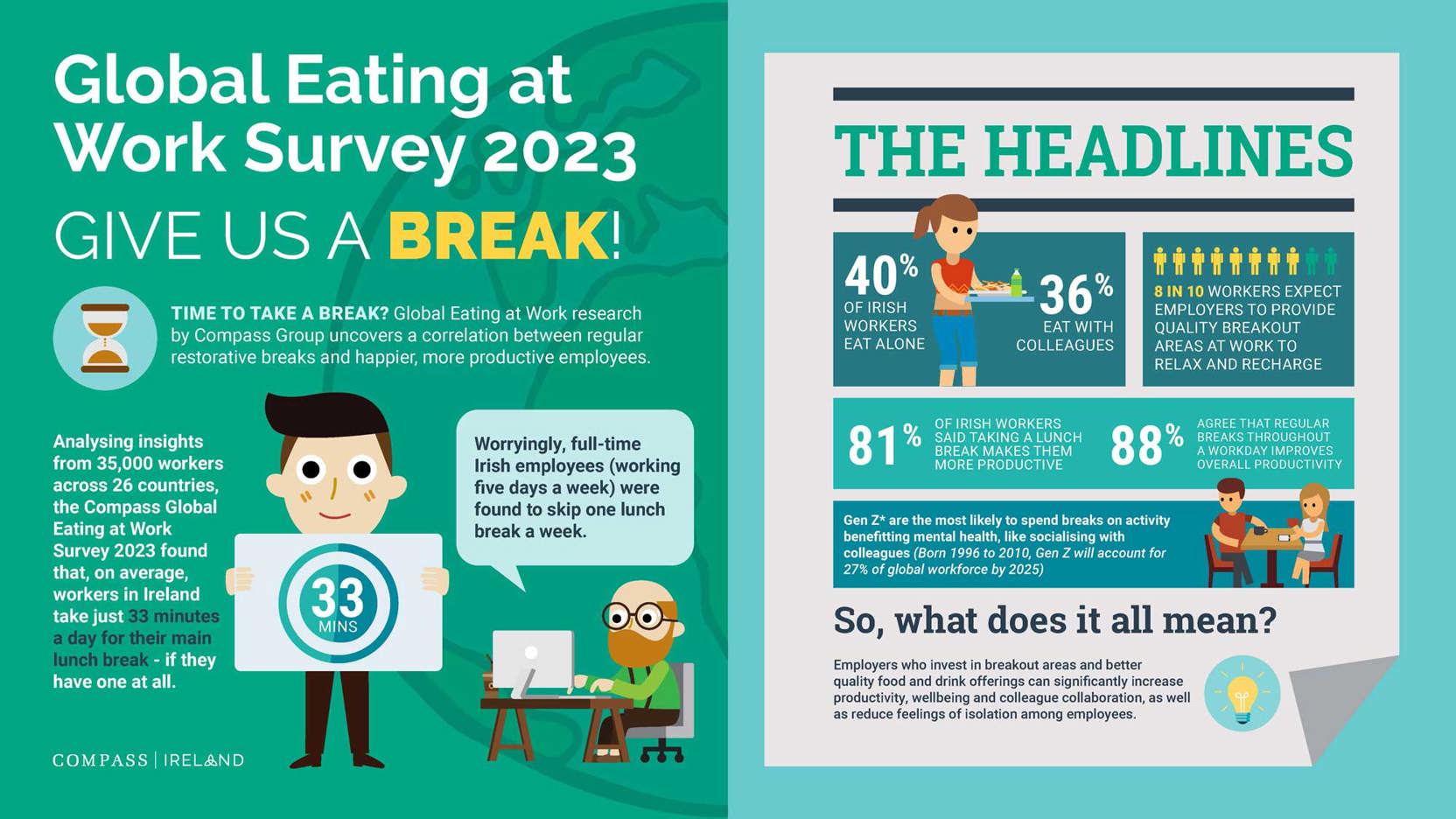Global Eating at Work research by Compass Group confirms regular restorative breaks correlate with happier, more productive employees.
- Lunch breaks in Ireland take 33 minutes a day, 2 minutes less than the 35-minute global average.
- Globally, a third of workers eat alone; Irish figures indicate 40% lunch alone, 36% with colleagues.
- 8 in 10 workers expect employers to provide quality breakout areas at work to relax and recharge.
- Hybrid workers report having more regular, higher quality breaks at home than in the workplace.
- Employers must compete with home comforts to encourage home-workers back to the workplace
- Gen Z* most likely to spend breaks on activity benefitting mental health, like socialising with colleagues (Born 1996 to 2010, Gen Z will account for 27% of global workforce by 2025)
Napoleon established 200 years ago that an army marches on its stomach.
Now it seems employers that encourage longer, better quality, more frequent breaks hold the key to unlocking productivity, improving employee wellbeing, and enticing people back to work.
New research by food services company, Compass Ireland, and global market intelligence agency Mintel, found that the length of time workers spend on their main lunch break varies considerably around the world. It averages 54 minutes in China, one of the world’s fastest growing economies, to just over 20 minutes in Poland. Lunch breaks in Ireland take 33 minutes.
Analysing insights from 35,000 workers across 26 countries, the Compass Global Eating at Work Survey 2023 shows that, on average, workers take just 35 minutes a day for their main lunch break, if they have one at all. Full time employees (working five days a week) were found to skip one lunch break a week, including those surveyed in Ireland, while a third of workers eat their lunch alone, reducing opportunities for socialising.
1% of Irish workers report that they take no breaks at all during their working week, risking burnout; although this figure is considerably below the global average of 5%.
Better breaks support productivity, wellbeing and team building
The research indicates that employers who invest in good breakout areas and better quality food and drink offerings can significantly increase productivity, wellbeing and colleague collaboration, as well as reducing feelings of isolation among employees.
81% of Irish workers said taking a lunch break makes them more productive, while 88% agree that regular breaks throughout a workday improves their overall productivity. To better support employee wellbeing, 8 in 10 workers expect employers to provide a place at work where they can take a proper break to relax and recharge.
Globally, Gen Z and Baby Boomers take the shortest lunch breaks, and how employees like to spend their personal time varies across different age groups. This indicates employers should tailor breakout areas to match unique workforce demographics.
While eating and drinking during a break is the top priority for every age group (Baby Boomers most of all), younger Gen Z and Millennial workers want the time for things that support their mental health. These include socialising with colleagues, relaxing, hobbies and personal interests.
The research also found that employees are significantly more likely to socialise and network with colleagues during breaks, if they have food and drink facilities at work. The more advanced the food offer provided, the stronger this trend becomes:
In workplaces with a restaurant, cafeteria, canteen, or coffee shop, 70% of workers choose to eat lunch with colleagues, with only 23% eating by themselves.
In contrast, when no food and drink facilities are provided, just 38% spend their main break with colleagues, while nearly half (48%) choose to eat alone.

Employers compete with home comforts to encourage home-workers back into workplace
While the length of main breaks is largely consistent across home-based, hybrid and work-based employees, those working from home report having more frequent and higher quality breaks than when in the workplace. This presents a considerable challenge for employers trying to encourage workers back to the office.
In Ireland, 50% of hybrid workers say they take more breaks when working from home. 62% say they can truly relax during breaks at home, compared to 58% in the workplace.
79% of workers say it is important that employers provide a place where they can take a proper break, and facilities that support mental wellbeing. However, only 31% of Irish employers provide a staff restaurant on-site, according to the survey, while more than a third (34%) of workers say their employer doesn’t have a suitable breakout area for them to relax and recharge.
Deirdre O Neill, Managing Director at Compass Ireland, says that with recruitment and productivity a key challenge facing businesses today, employees taking time out of the working day to relax and recharge with colleagues can make a huge difference.
“It may seem counterintuitive, but good quality breaks are a win-win for employees and employers, enhancing productivity, collaboration, and mental health.
“Taking a lunch break is no longer a routine event at a set time of day, either, our research shows. With the rise of flexible working, employees now expect to refuel when and where suits them best. They want convenient, good quality food and drink to provide an energy boost, and comfortable places to relax and socialise with colleagues.”
Employers looking to motivate their teams, attract new talent, and encourage hybrid workers back into the workplace are investing in what is known as the ‘hotelisation’ of workspaces, according to Deirdre O Neill.
Comfortable breakout areas and some form of entertainment, such as ping-pong or TVs, are becoming much more common. So too, roof-top gardens and patios are popular for coffee breaks. Employers are conscious of meeting the needs of workers by providing food and refreshments, combined with social interaction, that people can’t replicate at home. The smart employers are creating a workplace culture where breaks are encouraged, not frowned on.”



